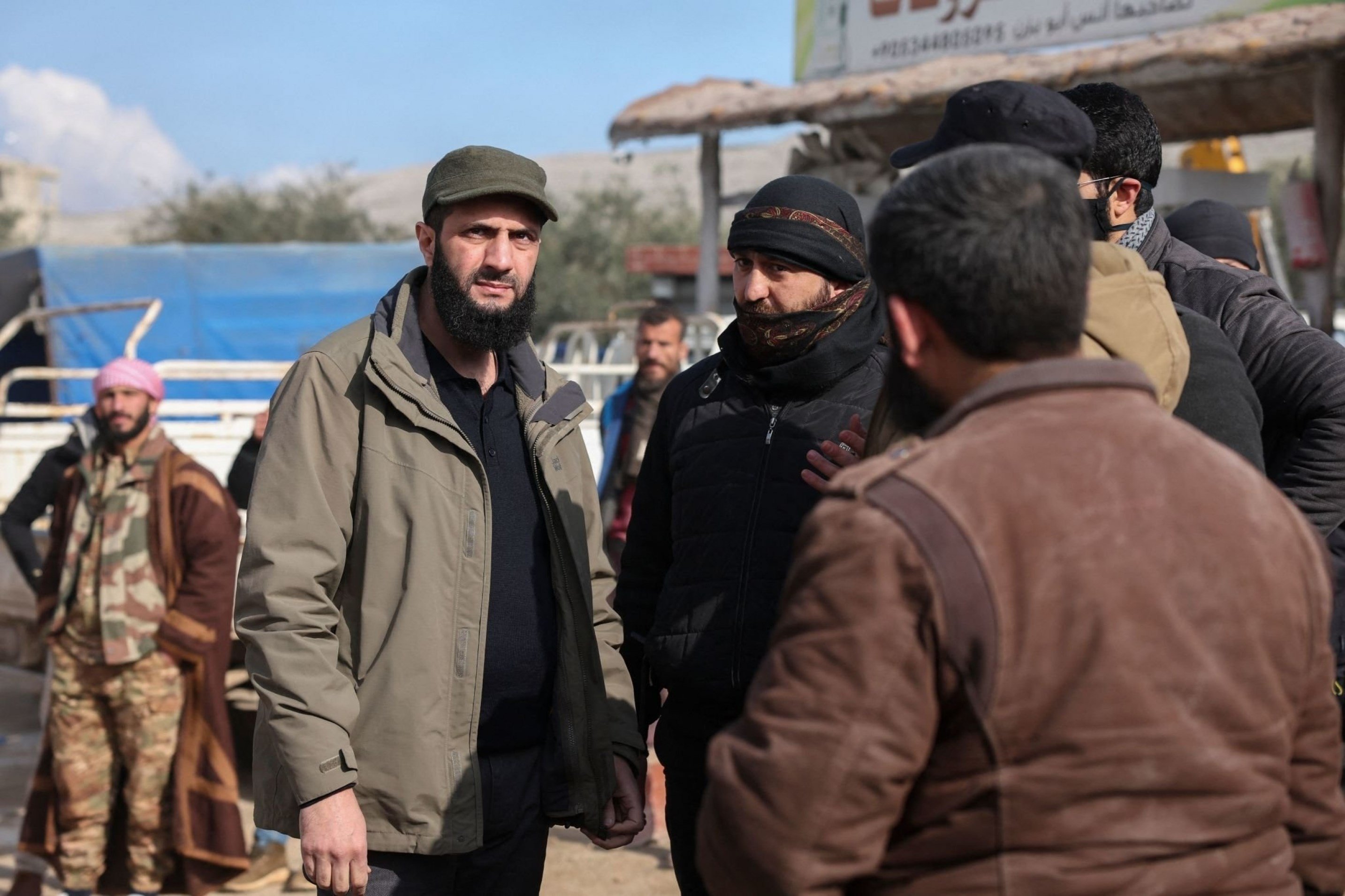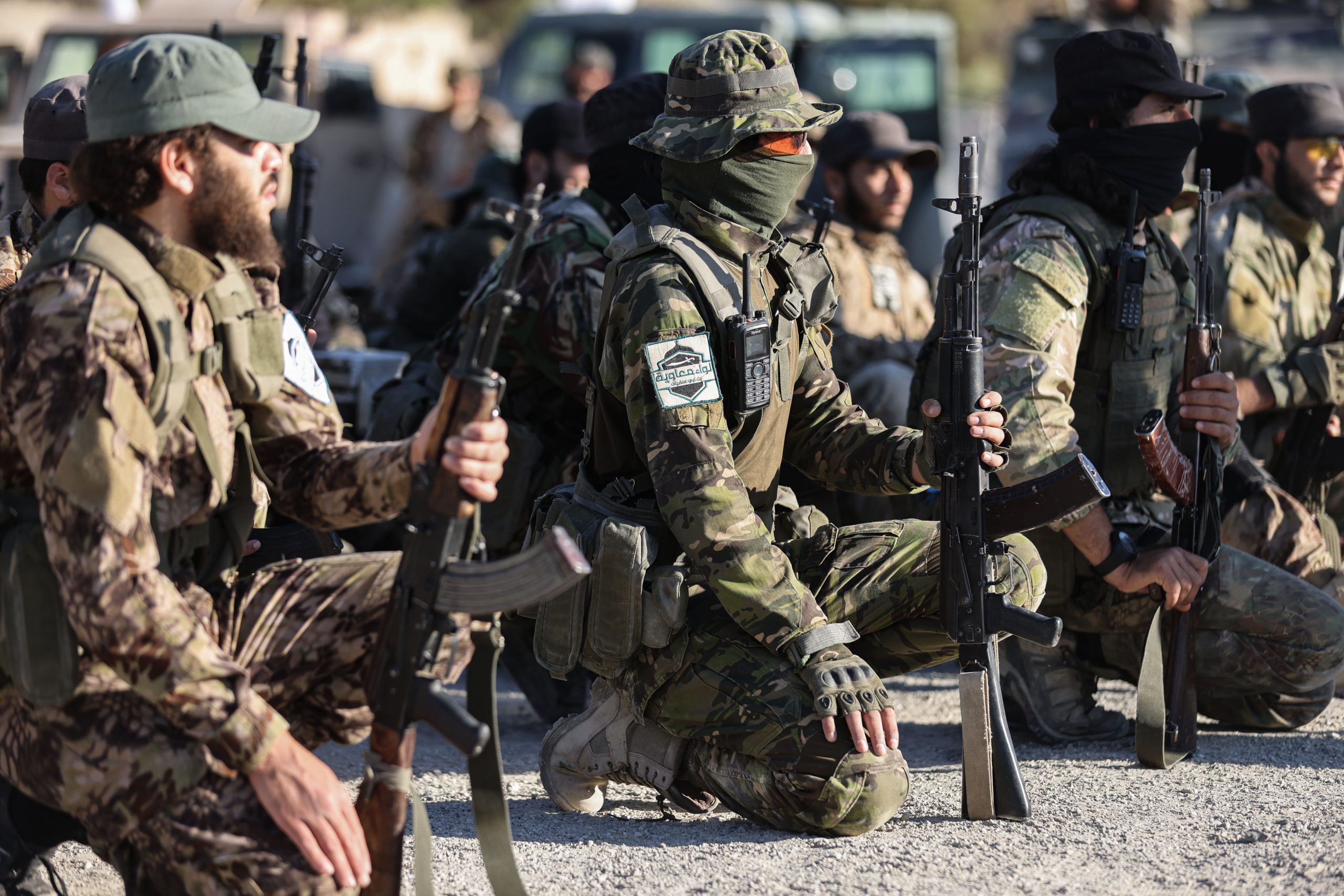Who is the current leader of Hayat Tahrir al-Sham? Abu Muhammad al-Julani has been the leader of Hayat Tahrir al-Sham (HTS) since 2017.
Editor's Notes: Abu Muhammad Al-Julani: Leader Of Hayat Tahrir Al-Sham article published on 26th January 2023.
.Information provided on our website about Abu Muhammad Al-Julani: Leader Of Hayat Tahrir Al-Sham is valid, factually correct, and based on up-to-date research. As with any industry, changes can occur quickly.
We have done the analysis, research, and product comparison to help you pick the best << Abu Muhammad Al-Julani: Leader Of Hayat Tahrir Al-Sham>> for your need.
FAQ on the Abu Muhammad Al-Julani: Leader Of Hayat Tahrir Al-Sham.
This FAQ section provides answers to commonly asked questions and addresses misconceptions about Abu Muhammad Al-Julani, the leader of Hayat Tahrir Al-Sham. It aims to clarify his background, ideology, and role in the Syrian conflict.
![]()
(Photos) Hayy'at Tahrir al-Sham's (HTS) Leader, Abu Muhammad al-Joulani - Source trackingterrorism.org
Question 1: Who is Abu Muhammad Al-Julani?
Al-Julani is a Syrian jihadist who has led Hayat Tahrir Al-Sham (HTS), a prominent rebel group in the Syrian civil war, since 2013. Prior to leading HTS, he was a senior commander within Jabhat al-Nusra, Al-Qaeda's former affiliate in Syria.
Question 2: What is HTS's ideology and goals?
HTS is an Islamist rebel group that seeks to establish an Islamic state in Syria based on Sharia law. It does not align itself with the Islamic State of Iraq and Syria (ISIS) and has been in opposition to the group since 2014.
Question 3: What is Al-Julani's role in HTS?
As HTS's leader, Al-Julani is responsible for the group's military operations, strategic decision-making, and ideological direction. He is believed to have a significant influence on HTS's policies and actions.
Question 4: What controversies have surrounded Al-Julani?
Al-Julani has been accused of human rights abuses, including executions and torture. He has also been criticized for his alleged ties to Al-Qaeda and for his refusal to negotiate with the Syrian government.
Question 5: What is the current status of HTS in Syria?
HTS controls a significant portion of northwestern Syria, including the province of Idlib. The group has been fighting against government forces in the region and has also clashed with other rebel groups.
Question 6: What is the international community's stance on HTS?
HTS is designated as a terrorist organization by the United States, the United Nations, and several other countries. Its activities in Syria have been condemned by the international community.
Question 7: What are the prospects for a peaceful resolution in Syria?
The Syrian civil war remains complex, with multiple parties involved. The role of HTS and other rebel groups in any potential peace process is uncertain. However, efforts to find a political solution to the conflict continue.
This FAQ section has provided a brief overview of Abu Muhammad Al-Julani and HTS. It is important to note that the situation in Syria is fluid and subject to change. Continued monitoring and analysis are necessary to understand the evolving dynamics of the conflict.
Tips from Abu Muhammad Al-Julani: Leader Of Hayat Tahrir Al-Sham
Abu Muhammad Al-Julani, the leader of Hayat Tahrir Al-Sham, has shared several valuable tips and advice. These tips provide guidance on a range of topics, including leadership, strategy, and personal development.
Tip 1: Cultivate Patience and Resilience
In the face of adversity, it is crucial to maintain patience and resilience. Instead of becoming discouraged by setbacks, learn from mistakes and adapt strategies accordingly.
Tip 2: Prioritize Clear Communication
Effective communication is essential for success. Communicate goals, expectations, and instructions clearly to ensure understanding and alignment within the team.
Tip 3: Foster a Culture of Discipline and Accountability
Discipline and accountability are key to maintaining order and productivity. Establish clear rules, guidelines, and consequences to encourage responsible behavior.
Tip 4: Embrace Learning and Adaptation
Continuous learning and adaptation are crucial for personal and organizational growth. Seek knowledge, stay informed about current events, and be open to new ideas and perspectives.
Tip 5: Seek Wisdom and Guidance from Elders
Respect and learn from the experiences and wisdom of elders. They offer valuable insights, advice, and guidance that can inform decision-making and strategic planning.
Tip 6: Maintain Physical and Mental Well-being
Prioritize physical and mental well-being. Engage in regular exercise, maintain a healthy diet, and seek professional help if needed to ensure optimal performance and well-rounded development.
Tip 7: Practice Humility and Self-Reflection
Cultivate humility and practice self-reflection. Recognize strengths and weaknesses, and seek feedback to identify areas for improvement and personal growth.
Tip 8: Lead by Example
Leaders must set a positive example by embodying the values they promote. Demonstrate integrity, commitment, and a strong work ethic to inspire and motivate others.
These tips provide a valuable framework for personal and organizational success. By implementing these principles, individuals and leaders can enhance their leadership skills, foster a productive environment, and navigate challenges effectively.
To learn more about the teachings of Abu Muhammad Al-Julani, refer to the official website and other reputable sources.
Abu Muhammad Al-Julani: Leader Of Hayat Tahrir Al-Sham
Abu Muhammad Al-Julani's role as the leader of Hayat Tahrir Al-Sham holds significant implications for the Syrian conflict, terrorism, and regional stability. His leadership has shaped the group's ideology, operations, and relations with other actors.
-

Al-Qaeda in Idlib? The bonds between Syria's largest jihadi groups - Source thedefensepost.comIdeological Architect: Julani has played a key role in developing HTS's hardline ideology, which blends Salafi-jihadist beliefs with local Syrian grievances.
- Military Strategist: Under Julani's leadership, HTS has become a potent military force, employing guerrilla tactics and controlling significant territory in northwestern Syria.
- Negotiator: Julani has engaged in negotiations with various parties, including the Syrian government, rebel groups, and international actors, demonstrating his pragmatic approach.
- Regional Influence: HTS's presence in Syria has had regional implications, attracting foreign fighters and potentially destabilizing neighboring countries.
- Counterterrorism Target: Julani is a designated terrorist by the United States and other countries, making him a focus of international counterterrorism efforts.
- Syrian Conflict Mediator: As a prominent figure in the Syrian conflict, Julani has the potential to play a role in shaping the country's future through negotiations and power-sharing.
These key aspects highlight the multifaceted nature of Julani's leadership, which has implications not only for HTS but also for the broader political and security dynamics of Syria and the region.

Authorities crack down on Al-Julani's 0 million assets in Turkey - Source english.almayadeen.net
Abu Muhammad Al-Julani: Leader Of Hayat Tahrir Al-Sham
Abu Muhammad Al-Julani is the leader of Hayat Tahrir Al-Sham (HTS), an armed group fighting in the Syrian Civil War. HTS is designated as a terrorist organization by the United States, the United Kingdom, and the United Nations. Al-Julani is a controversial figure, and his leadership of HTS has been criticized by both the Syrian government and the international community.
Al-Julani was born in 1984 in the Syrian town of Idlib. He joined the Syrian military in 2003, but defected in 2011 to join the rebels fighting against the government of President Bashar al-Assad. In 2012, he became the leader of HTS, which was formed by the merger of several rebel groups.
Under Al-Julani's leadership, HTS has become one of the most powerful armed groups in Syria. The group controls a large area of territory in northwestern Syria, and it has been accused of committing human rights abuses, including summary executions, torture, and kidnappings.
Al-Julani is a controversial figure, and his leadership of HTS has been criticized by both the Syrian government and the international community. The Syrian government has accused Al-Julani of being a terrorist, and the international community has designated HTS as a terrorist organization.
Despite the criticism, Al-Julani remains a popular figure among some Syrians. He is seen by many as a symbol of resistance to the Assad government, and his supporters believe that he is fighting for a better future for Syria.

How a former al-Qaeda affiliate became an existential threat and a wake - Source www.atlanticcouncil.org
Al-Julani's leadership of HTS has had a significant impact on the Syrian Civil War. Under his leadership, HTS has become one of the most powerful armed groups in Syria, and it has played a major role in the fighting against the Assad government.
Al-Julani's leadership of HTS has also had a significant impact on the international community. The group's designation as a terrorist organization by the United States, the United Kingdom, and the United Nations has led to increased scrutiny of Al-Julani and his activities.
Al-Julani's leadership of HTS is a complex and controversial issue. There is no easy answer to the question of whether he is a terrorist or a freedom fighter. However, there is no doubt that he is a powerful figure who has had a significant impact on the Syrian Civil War.
| Name | Role |
|---|---|
| Abu Muhammad Al-Julani | Leader of Hayat Tahrir Al-Sham |
| Hayat Tahrir Al-Sham (HTS) | Armed group fighting in the Syrian Civil War |
Conclusion
Abu Muhammad Al-Julani is a controversial figure who has had a significant impact on the Syrian Civil War. His leadership of HTS has made him a target of both the Syrian government and the international community. However, he remains a popular figure among some Syrians who see him as a symbol of resistance to the Assad government.
The future of HTS and Al-Julani's role in the Syrian Civil War is uncertain. However, it is clear that he will continue to be a major player in the conflict for the foreseeable future.
